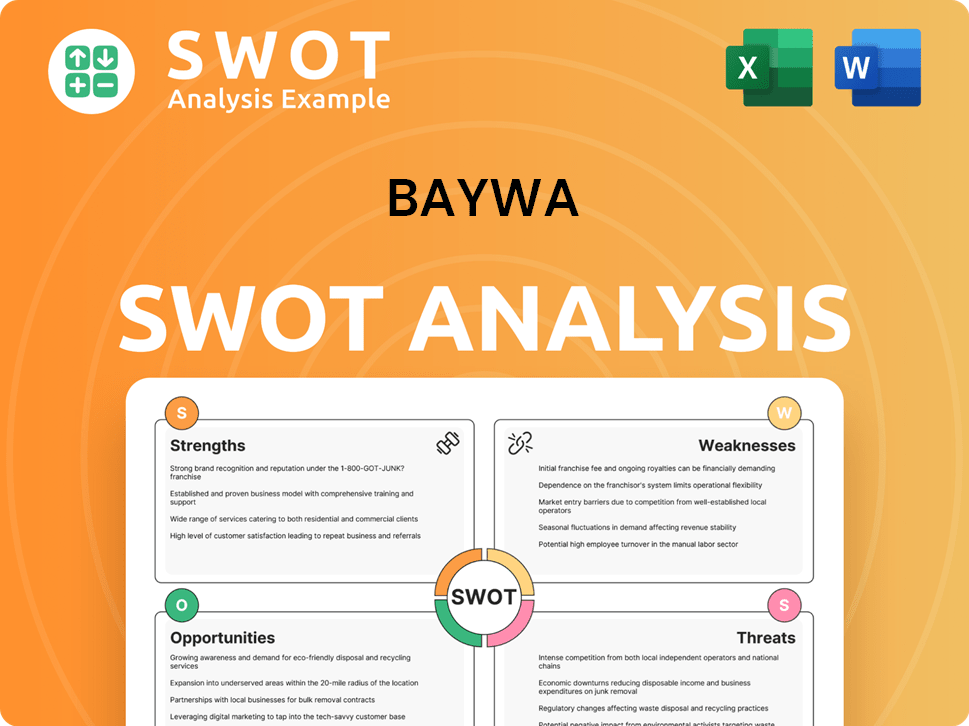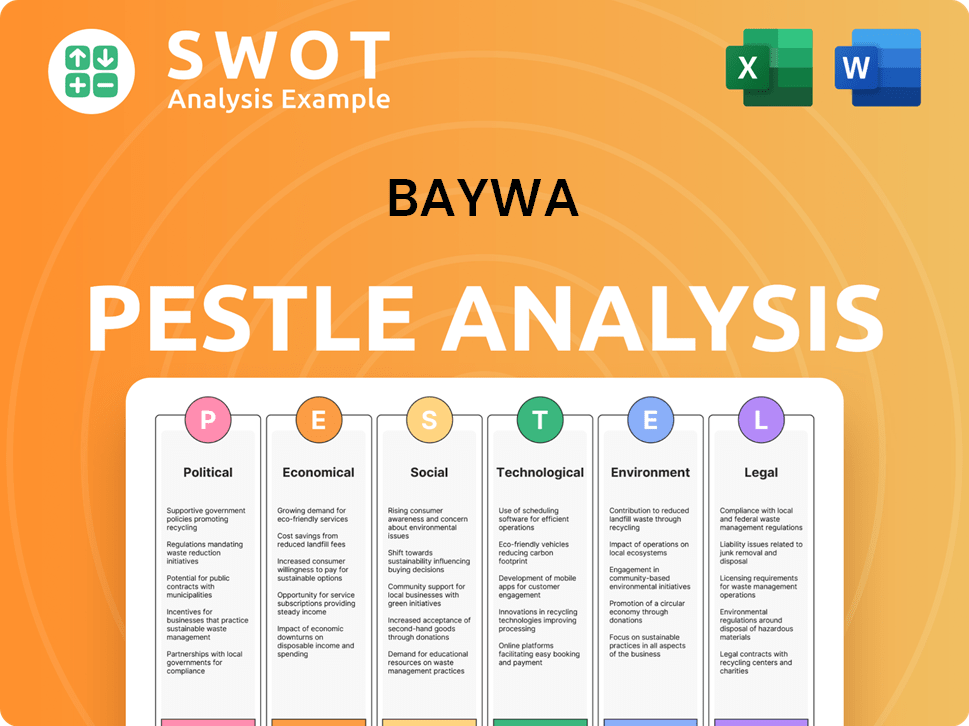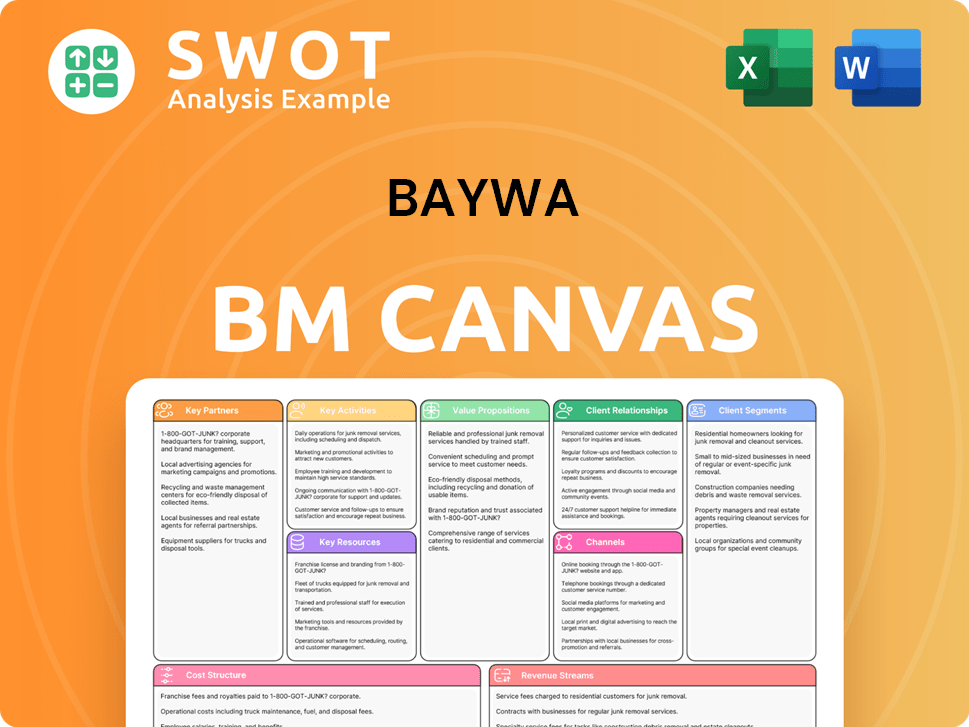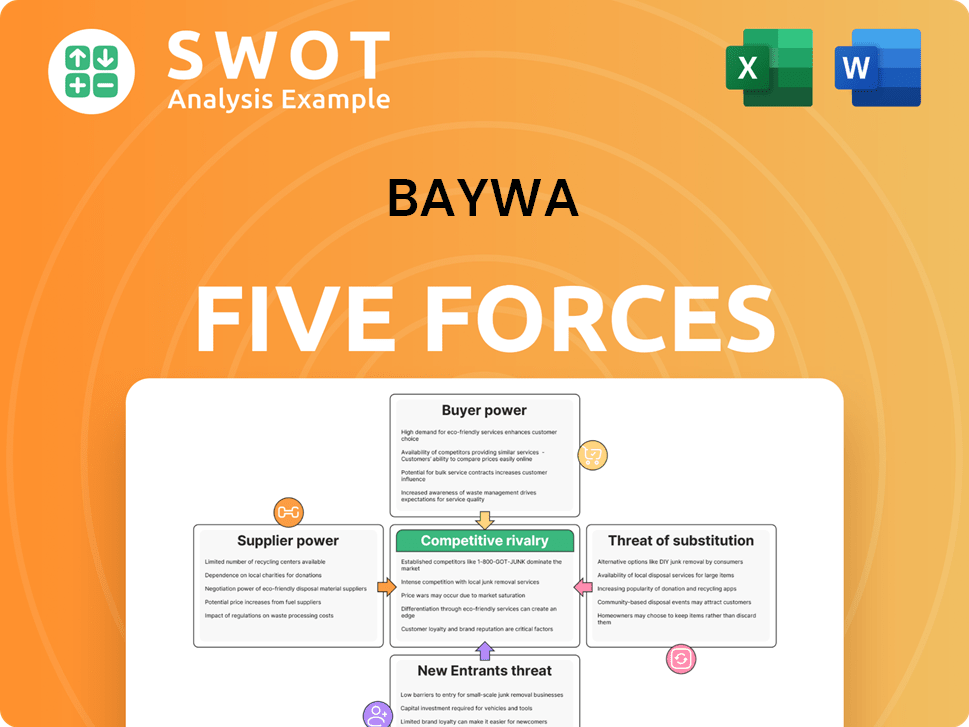BayWa Bundle
How Does BayWa Navigate the Global Marketplace?
BayWa AG, a global powerhouse based in Munich, Germany, has masterfully evolved its sales and marketing approach across agriculture, energy, and building materials. From its roots supporting German agriculture to its current status as a leader in renewable energy, BayWa's journey is a testament to strategic adaptation. Understanding the BayWa SWOT Analysis is key to grasping its market positioning.

This article delves into the intricacies of the BayWa sales strategy and BayWa marketing strategy, exploring how the BayWa company has built its brand and maintained a competitive edge. We'll examine the BayWa business model, providing a detailed BayWa market analysis and showcasing its innovative BayWa agricultural solutions and renewable energy initiatives. Discover the secrets behind BayWa's success, from its digital marketing initiatives to its customer relationship management strategies.
How Does BayWa Reach Its Customers?
The sales strategy of the company, a prominent player in agriculture, energy, and building materials, relies on a multifaceted approach. This strategy integrates both online and offline channels to effectively reach its diverse customer base. The company's approach involves a strategic blend of physical retail locations, direct sales teams, wholesale distributors, and digital platforms.
The company's business model is characterized by its ability to adapt and integrate various sales channels. This is evident in its shift towards digital adoption and omnichannel integration. The company has been actively linking its physical sales network with online platforms, enhancing customer experience and sales efficiency. This approach is crucial for maintaining a competitive edge in today's market.
The company's market analysis reveals a strong emphasis on customer service and quality, both online and offline. Key partnerships and exclusive distribution deals have significantly contributed to the company's growth and market share. The company's sales performance analysis indicates a robust and adaptable framework, essential for navigating the complexities of its varied sectors.
Offline channels include physical retail locations and direct sales teams, particularly in agricultural equipment and building materials. The Agricultural Equipment Segment saw revenues of €2.2 billion in 2023. A dense network of workshops supports service and maintenance. Wholesale distributors also play a crucial role in market penetration.
The company has been integrating its physical sales network with online platforms. The company's portal allows customers to order online and choose delivery or in-store pickup. The company utilizes e-commerce platforms and its website to facilitate sales, with quality and service as top priorities.
Acquisitions like Dutch grain trader Cefetra and New Zealand fruit trader Turners & Growers have strengthened the company's global position. In renewable energy, the subsidiary, BayWa r.e., pools project business for wind and solar energy. BayWa r.e. actively sells solar projects, including significant transactions in the US and France in 2024.
Energy Infrastructure Partners (EIP) is set to become the majority shareholder of BayWa r.e. with a 65% stake as of February 2025. EIP will inject €150 million to support restructuring and focus on building an independent power producer portfolio. This strategic move underscores the company's commitment to the renewable energy sector.
The company's sales strategy for renewable energy includes significant project development and sales, particularly through BayWa r.e. The company's approach to sales is multifaceted, encompassing direct sales, wholesale distribution, and digital platforms. For more details on the company's history and evolution, you can read a Brief History of BayWa.
The company employs a mix of online and offline channels. The company's sales strategy includes direct sales teams, retail locations, and wholesale distributors. Digital platforms and e-commerce are integrated to enhance customer experience and sales efficiency.
- Physical retail locations and direct sales teams.
- Online platforms and e-commerce integration.
- Wholesale distribution networks.
- Strategic partnerships and acquisitions.
BayWa SWOT Analysis
- Complete SWOT Breakdown
- Fully Customizable
- Editable in Excel & Word
- Professional Formatting
- Investor-Ready Format

What Marketing Tactics Does BayWa Use?
The company's marketing strategy employs a multifaceted approach, blending digital and traditional tactics to enhance brand awareness, generate leads, and drive sales across its diverse business segments. This strategy is designed to engage various target audiences, from business-to-business (B2B) and business-to-consumer (B2C) product communications to investor relations and employer branding. The integration of a Customer Relationship Management (CRM) system further optimizes customer service and support, enabling data-driven marketing and personalization.
Digital marketing initiatives, including content marketing, search engine optimization (SEO), paid advertising, email marketing, and social media platforms, are key components of the company's strategy. Traditional media, such as print and events, also play a role, particularly in reaching specific regional or industry-focused audiences. This approach allows for targeted campaigns and efficient resource allocation, reflecting a commitment to data-driven decision-making.
The company's marketing mix is evolving to reflect its increasing focus on sustainability and digital innovation. The brand refresh, including an expanded color palette and flexible design, aims to add more emotion to the brand and ensure a vibrant, consistent identity across all touchpoints. This demonstrates a notable innovation in how the company approaches its marketing, aiming for greater emotional connection and adaptability across channels. For more insights, consider exploring the Target Market of BayWa.
The company heavily utilizes digital marketing strategies, including content marketing, SEO, and social media. These are essential for communicating core messages and engaging with various target audiences.
Traditional media such as print and events remain relevant, especially for reaching specific regional or industry-focused audiences. This ensures a broad reach across different demographics.
Data-driven marketing is crucial, enabling targeted campaigns and efficient resource allocation. This approach allows for precise targeting and optimization of marketing efforts.
The use of a CRM system optimizes customer service and support. This integration allows for data-driven marketing, customer segmentation, and personalization.
The marketing mix reflects an increasing focus on sustainability and digital innovation. This is evident in the company's communications and brand refresh.
The brand refresh includes an expanded color palette and flexible design. This aims to add more emotion to the brand and ensure a consistent identity across all touchpoints.
The company's marketing strategy is a blend of digital and traditional methods, emphasizing data-driven decision-making and customer relationship management. The focus is on enhancing brand awareness and driving sales.
- Digital Marketing: Content marketing, SEO, paid advertising, email marketing, and social media.
- Traditional Marketing: Print media and events, particularly for regional and industry-specific audiences.
- Data Analysis: Utilizing data to target campaigns and allocate resources efficiently.
- Customer Relationship Management: CRM for optimized customer service and personalized marketing.
- Sustainability Marketing: Highlighting commitment to climate action and sustainability.
- Brand Consistency: Ensuring a vibrant and consistent brand identity across all channels.
BayWa PESTLE Analysis
- Covers All 6 PESTLE Categories
- No Research Needed – Save Hours of Work
- Built by Experts, Trusted by Consultants
- Instant Download, Ready to Use
- 100% Editable, Fully Customizable

How Is BayWa Positioned in the Market?
The core of the BayWa sales strategy and marketing strategy revolves around its cooperative heritage, emphasizing trust and innovation. This foundation is consistently communicated across its diverse operations in agriculture, energy, and building materials. The company differentiates itself by providing comprehensive solutions for essential needs like food, housing, and energy, which is a key component of its BayWa business model.
The visual identity and tone of voice are designed to convey reliability and responsibility, stemming from its cooperative heritage. BayWa aims to appeal to its target audience through a commitment to sustainable value creation. The company's efforts in sustainability have been recognized, achieving an A- rating in the CDP (Carbon Disclosure Project) in 2023. This commitment is a key element of its BayWa marketing strategy.
Brand consistency across channels and touchpoints is a critical aspect of BayWa's strategy. This ensures that the brand's core message and visual identity are uniform whether customers interact with the company online, through physical retail locations, or at events. BayWa actively responds to shifts in consumer sentiment and competitive threats by continuously reviewing and optimizing its location structure in agricultural input business and adding digital services. For more insights, explore the Growth Strategy of BayWa.
BayWa's brand is built on trust, solidity, and innovation, which are crucial for its BayWa sales strategy. These values are consistently communicated across all sectors, ensuring a cohesive brand image. This approach helps in building strong customer relationships and brand loyalty.
The company offers comprehensive solutions for essential needs like food, housing, heat, electricity, and mobility. This integrated approach, combined with a commitment to sustainability, sets BayWa apart. This unique positioning helps in attracting a diverse customer base.
BayWa's visual identity and tone of voice are designed to convey reliability and responsibility. This consistency helps build trust and reinforces its cooperative heritage. This approach is key for its BayWa marketing strategy in Germany.
BayWa is committed to sustainable value creation, aiming to triple the capacity of its wind and solar projects between 2023 and 2026. This focus is a key element of its BayWa sales strategy for renewable energy. The company achieved an A- rating in the CDP in 2023.
BayWa's dedication to sustainability is a core element of its brand, reflected in its marketing and sales efforts. This commitment is evident in its goal to triple the capacity of its wind and solar projects. The company's sustainability efforts are recognized by achieving an A- rating in the CDP in 2023.
Brand consistency is critical across all channels, ensuring a uniform message and visual identity. This includes online platforms, physical retail locations, and events. This approach is essential for effective customer engagement and brand recognition.
BayWa actively adapts to market changes by reviewing and optimizing its operations and adding digital services. Restructuring efforts, like 'Strategy 2030,' aim to increase profitability and strengthen crisis resilience. This adaptability ensures the company remains competitive.
BayWa's target audience includes farmers, energy consumers, and construction professionals. The company tailors its marketing and sales strategies to meet the specific needs of each segment. Understanding the target audience is crucial for effective marketing campaigns.
BayWa differentiates itself from competitors by offering comprehensive solutions and a commitment to sustainability. This unique selling proposition helps the company stand out in the market. This approach is a key aspect of its BayWa market analysis.
The company's strategic realignment, particularly in the renewable energy sector, ensures competitiveness in evolving markets. This includes investments in digital services and optimizing its sales processes. This ensures BayWa remains relevant.
BayWa Business Model Canvas
- Complete 9-Block Business Model Canvas
- Effortlessly Communicate Your Business Strategy
- Investor-Ready BMC Format
- 100% Editable and Customizable
- Clear and Structured Layout

What Are BayWa’s Most Notable Campaigns?
The sales and marketing strategies of BayWa, while not always explicitly labeled as 'campaigns,' are multifaceted and strategically aligned with its core business objectives. The company's approach is driven by a combination of market analysis, digital initiatives, and a strong focus on renewable energy and agricultural solutions. These strategies are designed to enhance its market position and drive growth across its diverse business segments. For a deeper understanding of the competitive environment, consider exploring the Competitors Landscape of BayWa.
Key initiatives include a significant push into renewable energies, digitalizing its agricultural business, and a company-wide restructuring project. These efforts reflect a comprehensive approach to sales and marketing, aiming to not only increase revenue but also improve operational efficiency and customer engagement. Each of these areas represents a strategic campaign, contributing to the overall success of BayWa.
These strategic campaigns are supported by financial investments and are closely monitored for performance. By focusing on renewable energy, digital agriculture, and internal restructuring, BayWa aims to strengthen its market position and achieve its financial goals.
BayWa's sales strategy for renewable energy is centered on expanding its portfolio of wind and solar projects. The company aims to triple the capacity of its own wind and solar projects between 2023 and 2026. This involves significant transactions, such as the sale of a 517 MWDC solar project portfolio in the US in October 2024, which was the largest portfolio sale in BayWa r.e. Group's history.
The company is strengthening its omnichannel presence through the digitalization of its agricultural business. Enhancements to the BayWa Portal, including the agent login function in 2021, support online and offline sales integration. This initiative is designed to increase efficiency and improve customer service.
Initiated in early 2025, this project is a strategic undertaking with implications for its brand and future direction. It includes a planned cash capital increase of around €150 million, with a focus on core profitable business areas. The goal is to return BayWa to profitability by 2024 and achieve earnings of between €470 and €520 million by the end of 2026.
The Agricultural Equipment Segment saw revenue increase to €1.8 billion and operating EBIT to €68.0 million in the first nine months of 2024. This growth was partially driven by a high order backlog and investment incentives, reflecting the success of integrated sales efforts. BayWa's sales team structure supports these efforts.
BayWa Porter's Five Forces Analysis
- Covers All 5 Competitive Forces in Detail
- Structured for Consultants, Students, and Founders
- 100% Editable in Microsoft Word & Excel
- Instant Digital Download – Use Immediately
- Compatible with Mac & PC – Fully Unlocked

Related Blogs
- What are Mission Vision & Core Values of BayWa Company?
- What is Competitive Landscape of BayWa Company?
- What is Growth Strategy and Future Prospects of BayWa Company?
- How Does BayWa Company Work?
- What is Brief History of BayWa Company?
- Who Owns BayWa Company?
- What is Customer Demographics and Target Market of BayWa Company?
Disclaimer
All information, articles, and product details provided on this website are for general informational and educational purposes only. We do not claim any ownership over, nor do we intend to infringe upon, any trademarks, copyrights, logos, brand names, or other intellectual property mentioned or depicted on this site. Such intellectual property remains the property of its respective owners, and any references here are made solely for identification or informational purposes, without implying any affiliation, endorsement, or partnership.
We make no representations or warranties, express or implied, regarding the accuracy, completeness, or suitability of any content or products presented. Nothing on this website should be construed as legal, tax, investment, financial, medical, or other professional advice. In addition, no part of this site—including articles or product references—constitutes a solicitation, recommendation, endorsement, advertisement, or offer to buy or sell any securities, franchises, or other financial instruments, particularly in jurisdictions where such activity would be unlawful.
All content is of a general nature and may not address the specific circumstances of any individual or entity. It is not a substitute for professional advice or services. Any actions you take based on the information provided here are strictly at your own risk. You accept full responsibility for any decisions or outcomes arising from your use of this website and agree to release us from any liability in connection with your use of, or reliance upon, the content or products found herein.